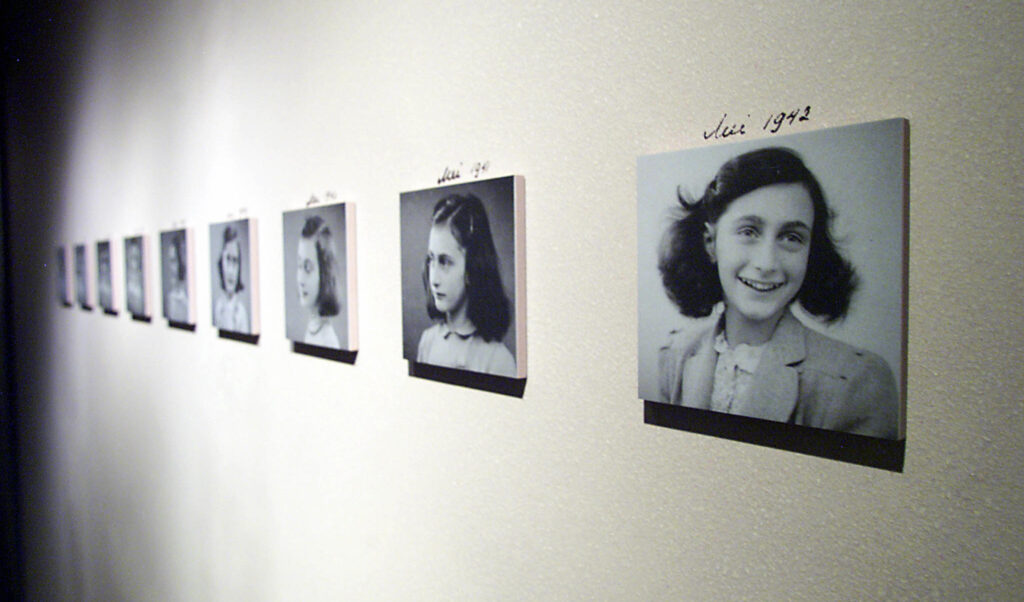Germany cannot afford to forget Anne Frank
Debate
07:00
Too many in the country are turning a blind eye to antisemitism
by Katja Hoyer
The Anne Frank Kindergarten is set to be renamed. Credit: Getty
Chants of “Free Palestine from German guilt” ringing through the streets, the Star of David graffitied onto the homes of Jewish residents, Molotov cocktails exploding against the walls of a synagogue — those are just some of the reasons why many Jews no longer feel safe in Germany.
Of course, such incidents conjure particularly painful memories for Jews there. While it had many collaborators across Europe, it was Nazi Germany whose virulent antisemitism was ultimately responsible for the systematic murder of six million Jewish men, women and children during the Second World War.
Like what you’re reading? Get the free UnHerd daily email
Already registered? Sign in
In the country which made “Never again!” its foundation mantra, some no longer care for the memory of the Holocaust and question its relevance for Germany’s domestic and foreign policy today.
Yesterday, a German nursery made headlines when it emerged that it no longer wanted to be named after Anne Frank. The country has 96 schools and many streets, squares and institutions which are named in memory of the German Jewish girl who died at the age of 15 in the Nazi concentration camp of Bergen-Belsen. Her diary is still required reading in many places all around the world, serving as a stark warning from history.
The Anne Frank Kindergarten has carried this name right from when it was first built in the 1970s in Tangerhütte, East Germany. Yet a new leadership team headed by Linda Schichor says that families “from a migration background” have issues with the name. Schichtor told a local newspaper that something “without a political background” would be preferable. She is supported by the town’s mayor, Andreas Brohm, who sees no problem in replacing “Anne Frank” with “Weltentdecker” (“World Explorer”) if the new name better reflects the institution’s drive for “open-mindedness” and “diversity”.
Tangerhütte’s town council has since announced that it will oppose the name change unanimously, accusing those who initiated the proposal of “historical ignorance”. But the fact remains that some leaders in education and local government think a nondescript name like “World Explorer” has more relevance for young Germans today than the story of a child who was murdered in their country just a couple of generations ago for belonging to a minority group.
Anne Frank isn’t a “political” figure. She didn’t die for her convictions or actions. She was murdered simply for who she was. She was born into a country that set Jewish houses of worship on fire when she was just nine years old, a country that attempted to eradicate the Jewish people from the time she was twelve. To claim this about the story of a child who was murdered by a regime intent on eliminating diversity at every level is absurd.
It is reassuring to see that the town council has rebuffed the renaming proposal. It is also encouraging that it was the mother of one of the children attending the nursey who alerted the press. She and her own mother had attended the Anne Frank Kindergarten too, and both were shocked and angry to hear of the plans to rename it. Much of the German press and many politicians have also been vocal in defending Jewish people against verbal and physical attacks.
But broader solidarity in the midst of German society is needed if the newly whipped-up tides of antisemitism are to be stemmed. In just the first week after Hamas terrorists infiltrated Israel on 7 October, 202 antisemitic incidents were recorded — an increase of 240% on the previous year.
For many Jews, the fear of being recognised has returned to Germany’s streets. And so has tacit approval and silence around abuse directed at Jewish people. “Behind closed doors, antisemitism has seeped right into the middle of society,” fears Josef Schuster, President of the Central Council of Jews in Germany. Two of his grandparents were murdered in Auschwitz. To him “Never again!” is more than an empty phrase. Whether that still applies to enough Germans to ensure the safety of their Jewish neighbours remains to be seen.
No Byline Policy
Editorial Guidelines
Corrections Policy
Source

